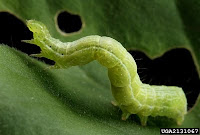
If a recent stroll around your yard left you wondering if something has died in the shrubbery then your landscape may be home to a harmless fungus known as the octopus stinkhorn or dead man’s fingers (Clathrus columnatus) (image, left). This small, foul smelling mushroom is not damaging to plants, people or pets, though the smell can be overpowering and unpleasant. The octopus stinkhorn appears during mild, damp weather, such as we are currently experiencing, and is one of several types of mysterious fungi that occasionally grow in hardwood mulch or wood chips.
On the whole, wood and bark mulches are very beneficial for landscapes, conserving water, moderating soil temperature, suppressing weeds, and adding organic matter and nutrients to the soil as they break down. Mulches and soils are alive with millions of microorganisms that work to decay organic matter and release nutrients, including many types of beneficial fungi and bacteria. From time to time, some of the more noticeable of these organisms may catch a gardener’s attention and cause them to wonder about their identity.
Read the entire article from the Pender County Cooperative Extension website

